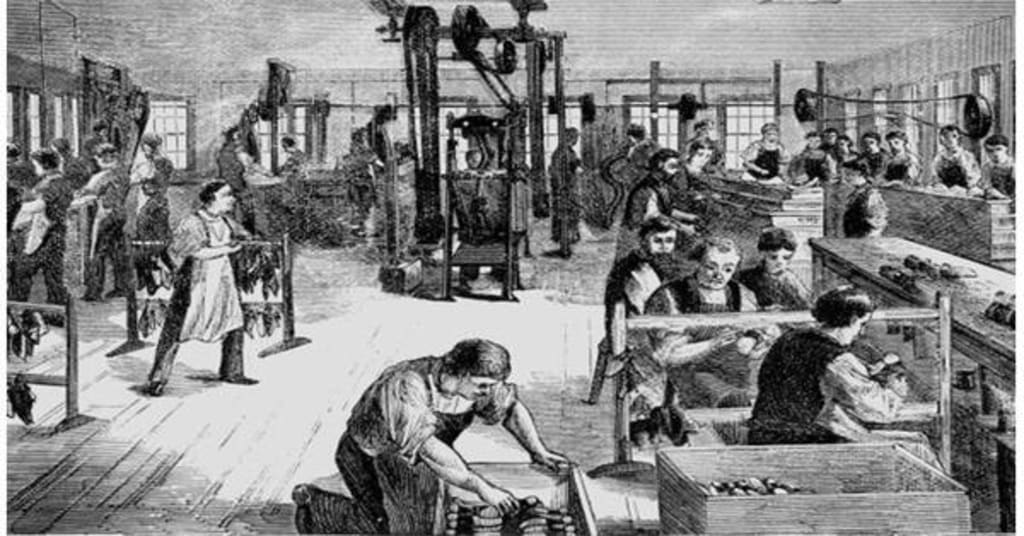The Industrial Revolution:
Igniting the Flames of Modernity

The Industrial Revolution saw a significant transition from agrarian communities to industrialized nations, making it one of the most trans-formative eras in human history. In this 600-word synopsis, we examine the causes, significant innovations, societal effects, and lingering legacies of this historic period.
Origins and Context:
Initially starting in Britain in the late 18th century, the Industrial Revolution later spread to other parts of Europe, North America, and the rest of the world. Significant social, economic, and technological advancements occurred during this period.
There were several factors that sparked this revolt. Innovations in agriculture had enhanced food production, which had caused population expansion. Investment opportunities existed thanks to trade and colonial venture capital, and the Enlightenment promoted a creative and inquisitive intellectual milieu.
Technological Innovations:
A succession of ground-breaking technological advancements that revolutionized the way things were produced were the driving force behind the Industrial Revolution. Important innovations were:
- The Steam Engine: In the late 18th century, James Watt made significant advancements to the steam engine. It offered a fresh supply of energy that could be used in a number of sectors, including transportation and the textile industry.
- Mechanized Textile Production: The spinning jenny, water frame, and power loom automated the textile industry, resulting in lower labor costs and significantly higher output.
- Iron and Steel Production: The Bessemer process, invented by Henry Bessemer in the mid-19th century, made steel production more efficient and affordable, enabling the construction of stronger machinery and infrastructure.
- Railways: The invention of steam locomotives and the growth of railroad networks changed travel by tying together disparate areas and easing the movement of both goods and people.
- The Telegraph: Long-distance communication was revolutionized by Samuel Morse's creation of the telegraph in the 1830s, which facilitated trade and business.
These inventions had a knock-on impact that sped up industrialization and changed economies.
Impact on Society:
The Industrial Revolution brought about significant social changes:
- Urbanization: The transition from agricultural rural life to urban cities was abrupt. Workers were drawn to factories, which resulted in congested, unhealthy circumstances in metropolitan areas.
- Working Conditions: Factory work was frequently arduous, involving long hours and dangerous circumstances. In reaction to these difficulties, social reform movements and labor unions were born.
- Child Labor: Child labor laws were demanded as a result of the frequent use of children in mills, mines, and factories.
- Economic Disparities: Income inequality became a topic as the chasm between wealthy manufacturers and the working class widened.
- Social and Cultural Changes: In order to fit industrial work schedules, families moved away from agrarian life during the Industrial Revolution, changing family patterns. Additionally, it had an impact on literature, art, and social movements.
Economic Transformation:
The Industrial Revolution revolutionized economies:
- Mass Production: Manufacturing facilities may produce goods on a never-before-seen scale, which would result in more inexpensive goods and greater consumer spending.
- Economic Growth: Market expansion, trade, and economic growth were all propelled by industrialization.
- Capitalism: A move toward market-based economies and capitalism, where private ownership and competition fueled innovation and prosperity, took place.
- Globalization: The Industrial Revolution had an impact on the entire world, changing trade patterns and giving rise to imperialism as developed countries looked for new resources and markets.
Legacy and Modern Relevance:
The Industrial Revolution's impact is still felt today:
- Technological Advancements: Modern industrial activities, from manufacturing to transportation, were made possible by many of the technological advancements made during the Industrial Revolution.
- Urbanization: Given that most people on earth live in cities, urbanization is still reshaping the world.
- Economic Systems: The dominating economic system around the world is capitalism, which emerged from the economic upheavals of this era.
- Social Reforms: Early industrialization's difficulties and inequalities sparked social and labor reforms, which laid the foundation for contemporary labor laws and workers' rights.
- Environmental Impact: Because mass manufacturing and resource exploitation resulted in pollution and resource depletion, the Industrial Revolution also raised more environmental concerns.
In summary, the Industrial Revolution was a fundamental turning point in human history that transformed civilizations, economics, and cultures. With advancements and improvements that still have an impact on our world today, it signaled the beginning of the modern era. It brought about previously unheard-of improvements but also posed enormous difficulties, reminding us of the intricate relationship between development and the state of humanity.
About the Creator
The Knowledge
Welcome to a virtual realm where the past, present, and future converge to unravel the mysteries of history, the wonders of science, and the treasure trove of general knowledge.






Comments
There are no comments for this story
Be the first to respond and start the conversation.